Detailed Report on Legislation and Ethics in Travel and Tourism Sector
VerifiedAdded on 2023/02/02
|11
|3187
|60
Report
AI Summary
This report delves into the legal and ethical frameworks governing the travel and tourism sector, focusing on the UK context. It begins with an introduction to relevant legislations and ethics, highlighting their importance for travel agencies, hospitality firms, and airports. The report then analyzes the legal and regulatory framework, including health and safety, data protection, and equality laws, evaluating their impact on companies like TUI Travel Plc. It examines contract legislations and ethical dilemmas faced by the industry, with a case study on Virgin Holidays Ltd. The report also explores corporate social responsibility (CSR) and the application of the natural law theory. The content covers various aspects of business ethics, including marketing, employment, and environmental concerns. The report aims to provide a comprehensive understanding of the legal and ethical challenges and opportunities within the travel and tourism industry.
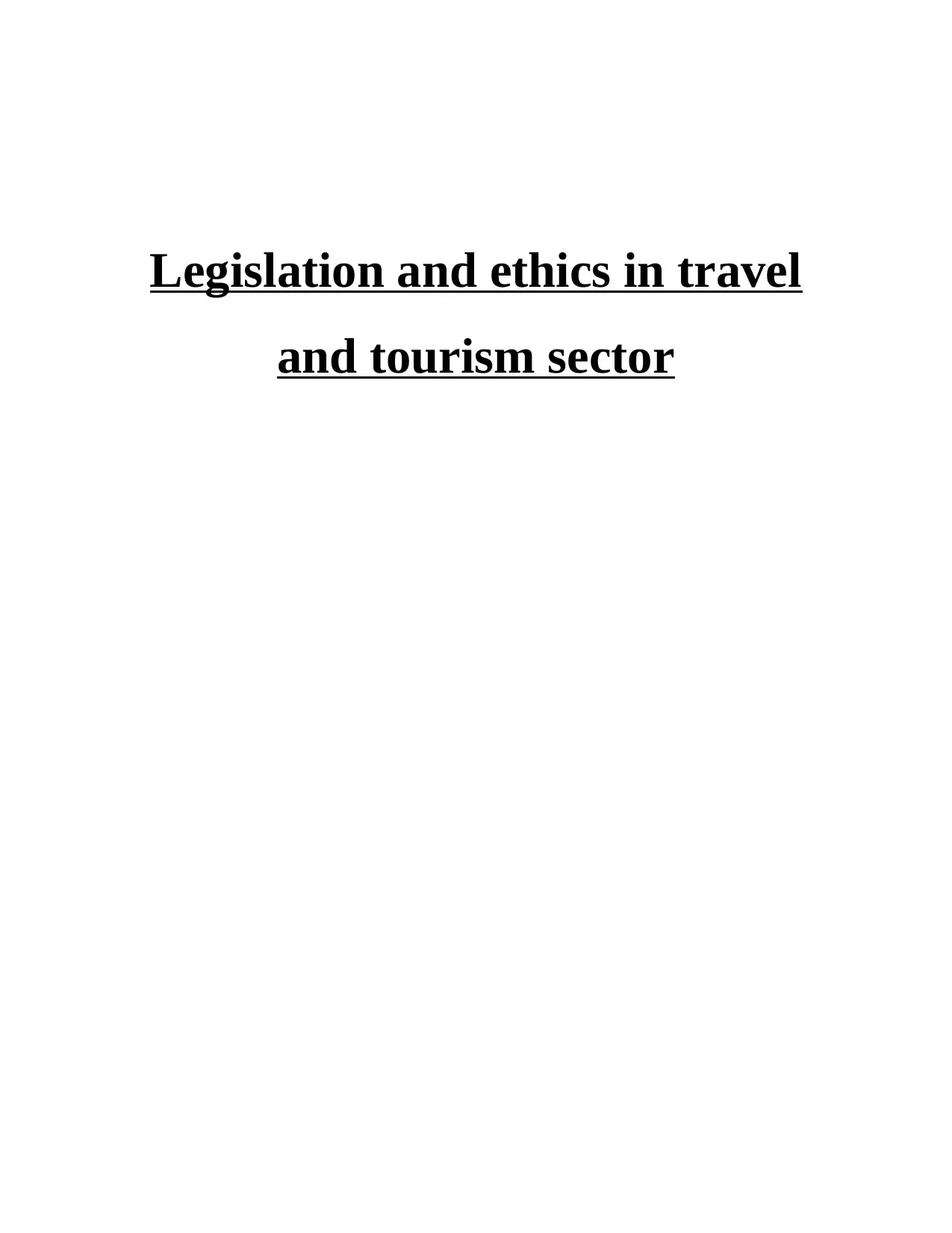
Legislation and ethics in travel
and tourism sector
and tourism sector
Paraphrase This Document
Need a fresh take? Get an instant paraphrase of this document with our AI Paraphraser
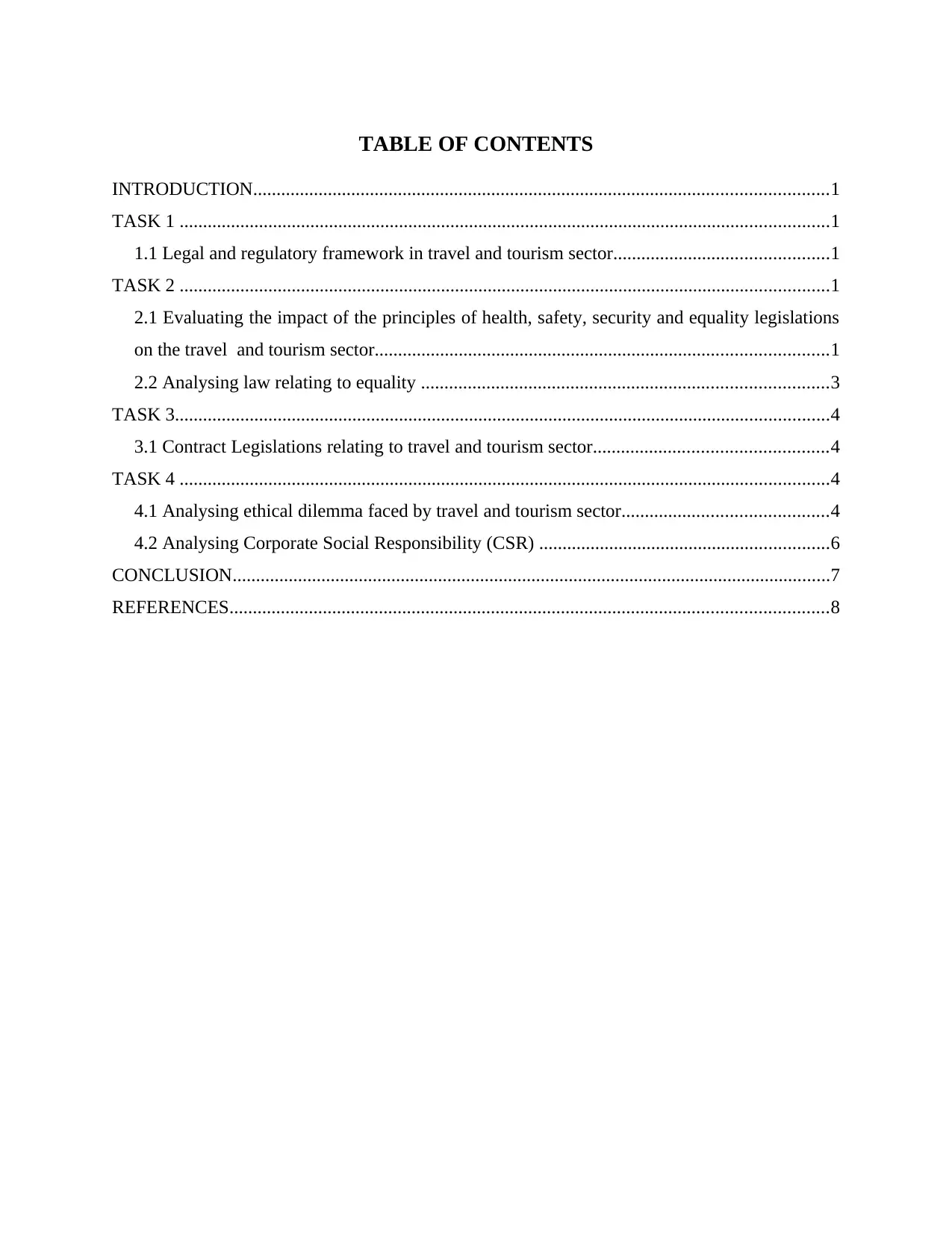
TABLE OF CONTENTS
INTRODUCTION...........................................................................................................................1
TASK 1 ...........................................................................................................................................1
1.1 Legal and regulatory framework in travel and tourism sector..............................................1
TASK 2 ...........................................................................................................................................1
2.1 Evaluating the impact of the principles of health, safety, security and equality legislations
on the travel and tourism sector.................................................................................................1
2.2 Analysing law relating to equality .......................................................................................3
TASK 3............................................................................................................................................4
3.1 Contract Legislations relating to travel and tourism sector..................................................4
TASK 4 ...........................................................................................................................................4
4.1 Analysing ethical dilemma faced by travel and tourism sector............................................4
4.2 Analysing Corporate Social Responsibility (CSR) ..............................................................6
CONCLUSION................................................................................................................................7
REFERENCES................................................................................................................................8
INTRODUCTION...........................................................................................................................1
TASK 1 ...........................................................................................................................................1
1.1 Legal and regulatory framework in travel and tourism sector..............................................1
TASK 2 ...........................................................................................................................................1
2.1 Evaluating the impact of the principles of health, safety, security and equality legislations
on the travel and tourism sector.................................................................................................1
2.2 Analysing law relating to equality .......................................................................................3
TASK 3............................................................................................................................................4
3.1 Contract Legislations relating to travel and tourism sector..................................................4
TASK 4 ...........................................................................................................................................4
4.1 Analysing ethical dilemma faced by travel and tourism sector............................................4
4.2 Analysing Corporate Social Responsibility (CSR) ..............................................................6
CONCLUSION................................................................................................................................7
REFERENCES................................................................................................................................8
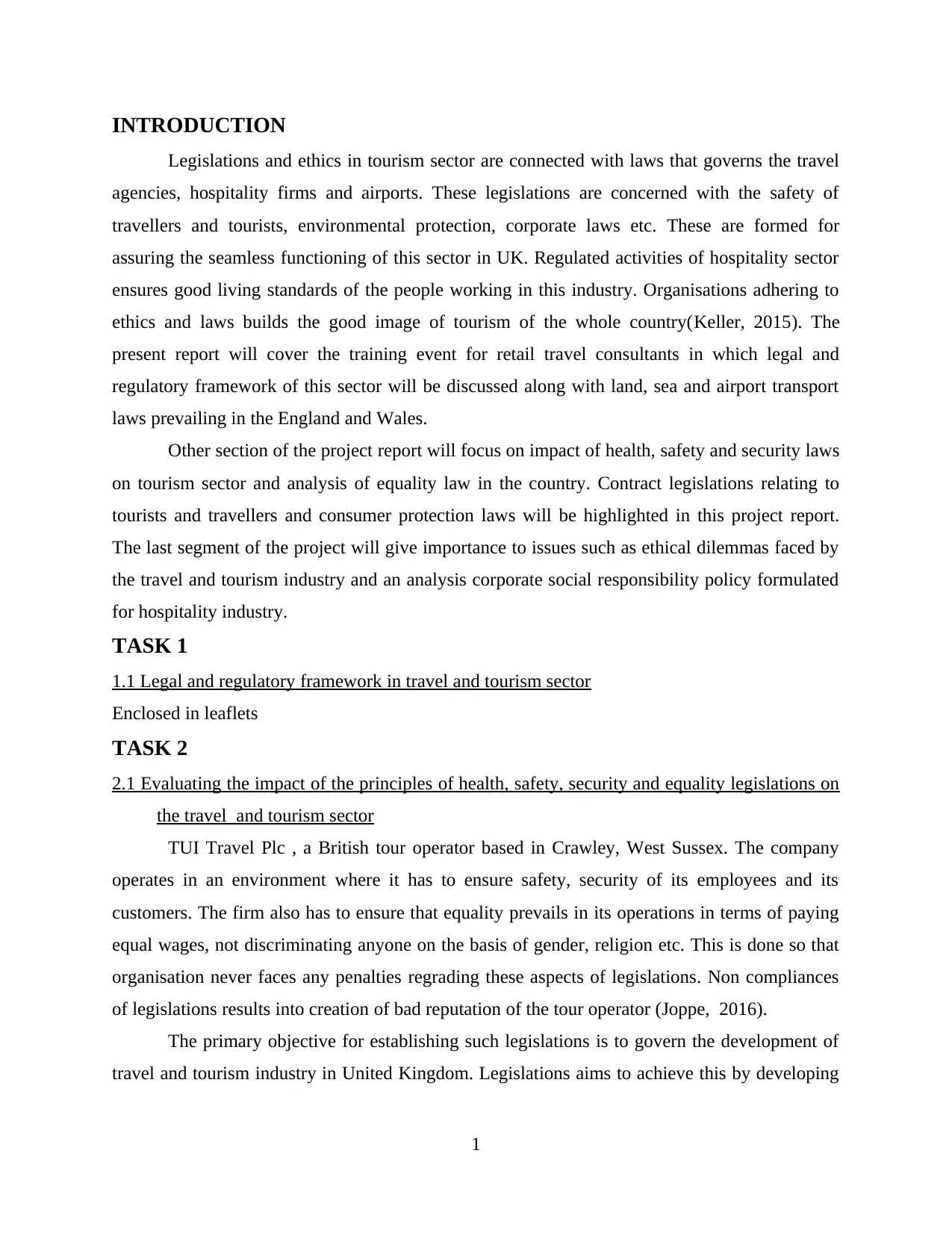
INTRODUCTION
Legislations and ethics in tourism sector are connected with laws that governs the travel
agencies, hospitality firms and airports. These legislations are concerned with the safety of
travellers and tourists, environmental protection, corporate laws etc. These are formed for
assuring the seamless functioning of this sector in UK. Regulated activities of hospitality sector
ensures good living standards of the people working in this industry. Organisations adhering to
ethics and laws builds the good image of tourism of the whole country(Keller, 2015). The
present report will cover the training event for retail travel consultants in which legal and
regulatory framework of this sector will be discussed along with land, sea and airport transport
laws prevailing in the England and Wales.
Other section of the project report will focus on impact of health, safety and security laws
on tourism sector and analysis of equality law in the country. Contract legislations relating to
tourists and travellers and consumer protection laws will be highlighted in this project report.
The last segment of the project will give importance to issues such as ethical dilemmas faced by
the travel and tourism industry and an analysis corporate social responsibility policy formulated
for hospitality industry.
TASK 1
1.1 Legal and regulatory framework in travel and tourism sector
Enclosed in leaflets
TASK 2
2.1 Evaluating the impact of the principles of health, safety, security and equality legislations on
the travel and tourism sector
TUI Travel Plc , a British tour operator based in Crawley, West Sussex. The company
operates in an environment where it has to ensure safety, security of its employees and its
customers. The firm also has to ensure that equality prevails in its operations in terms of paying
equal wages, not discriminating anyone on the basis of gender, religion etc. This is done so that
organisation never faces any penalties regrading these aspects of legislations. Non compliances
of legislations results into creation of bad reputation of the tour operator (Joppe, 2016).
The primary objective for establishing such legislations is to govern the development of
travel and tourism industry in United Kingdom. Legislations aims to achieve this by developing
1
Legislations and ethics in tourism sector are connected with laws that governs the travel
agencies, hospitality firms and airports. These legislations are concerned with the safety of
travellers and tourists, environmental protection, corporate laws etc. These are formed for
assuring the seamless functioning of this sector in UK. Regulated activities of hospitality sector
ensures good living standards of the people working in this industry. Organisations adhering to
ethics and laws builds the good image of tourism of the whole country(Keller, 2015). The
present report will cover the training event for retail travel consultants in which legal and
regulatory framework of this sector will be discussed along with land, sea and airport transport
laws prevailing in the England and Wales.
Other section of the project report will focus on impact of health, safety and security laws
on tourism sector and analysis of equality law in the country. Contract legislations relating to
tourists and travellers and consumer protection laws will be highlighted in this project report.
The last segment of the project will give importance to issues such as ethical dilemmas faced by
the travel and tourism industry and an analysis corporate social responsibility policy formulated
for hospitality industry.
TASK 1
1.1 Legal and regulatory framework in travel and tourism sector
Enclosed in leaflets
TASK 2
2.1 Evaluating the impact of the principles of health, safety, security and equality legislations on
the travel and tourism sector
TUI Travel Plc , a British tour operator based in Crawley, West Sussex. The company
operates in an environment where it has to ensure safety, security of its employees and its
customers. The firm also has to ensure that equality prevails in its operations in terms of paying
equal wages, not discriminating anyone on the basis of gender, religion etc. This is done so that
organisation never faces any penalties regrading these aspects of legislations. Non compliances
of legislations results into creation of bad reputation of the tour operator (Joppe, 2016).
The primary objective for establishing such legislations is to govern the development of
travel and tourism industry in United Kingdom. Legislations aims to achieve this by developing
1
⊘ This is a preview!⊘
Do you want full access?
Subscribe today to unlock all pages.

Trusted by 1+ million students worldwide
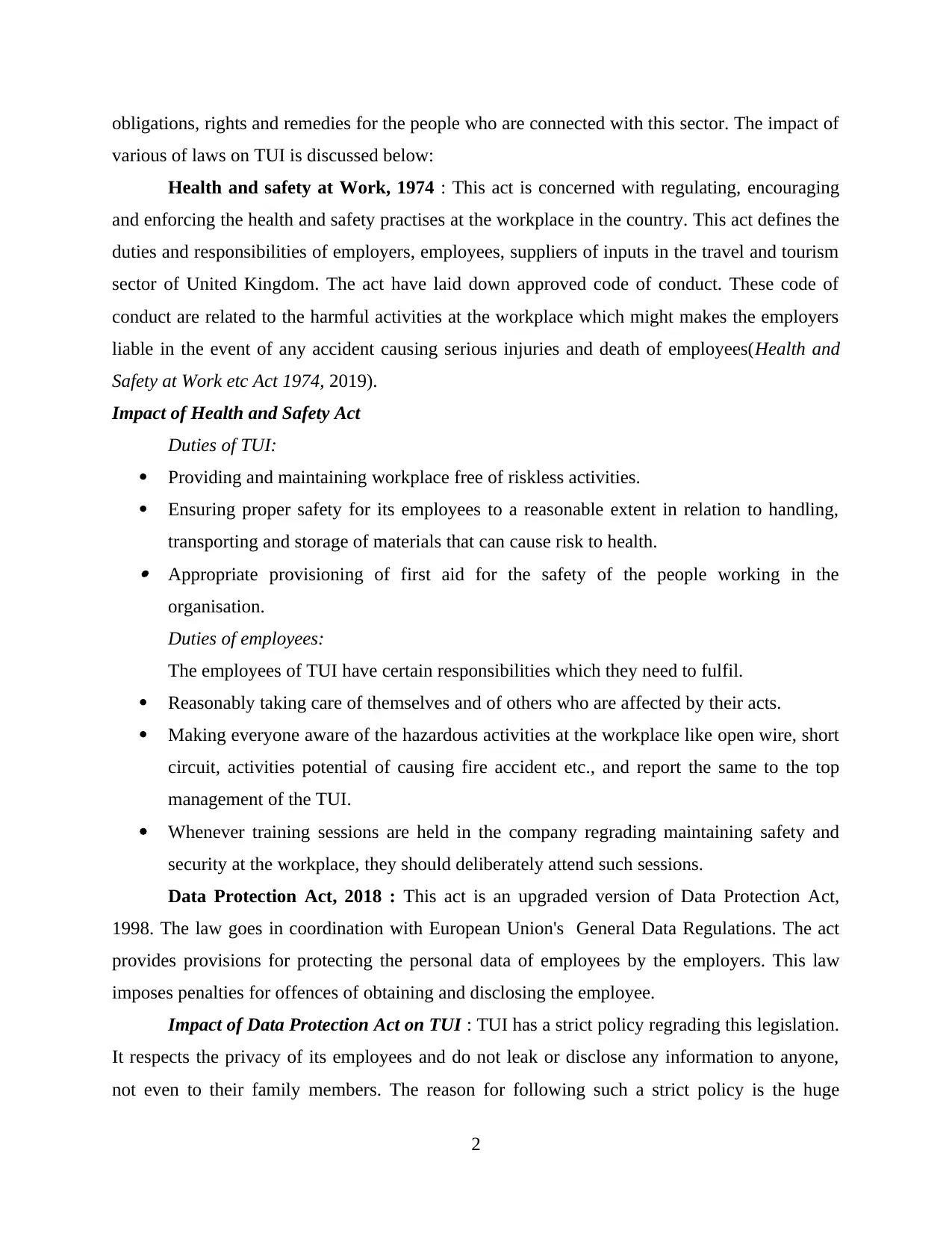
obligations, rights and remedies for the people who are connected with this sector. The impact of
various of laws on TUI is discussed below:
Health and safety at Work, 1974 : This act is concerned with regulating, encouraging
and enforcing the health and safety practises at the workplace in the country. This act defines the
duties and responsibilities of employers, employees, suppliers of inputs in the travel and tourism
sector of United Kingdom. The act have laid down approved code of conduct. These code of
conduct are related to the harmful activities at the workplace which might makes the employers
liable in the event of any accident causing serious injuries and death of employees(Health and
Safety at Work etc Act 1974, 2019).
Impact of Health and Safety Act
Duties of TUI:
Providing and maintaining workplace free of riskless activities.
Ensuring proper safety for its employees to a reasonable extent in relation to handling,
transporting and storage of materials that can cause risk to health. Appropriate provisioning of first aid for the safety of the people working in the
organisation.
Duties of employees:
The employees of TUI have certain responsibilities which they need to fulfil.
Reasonably taking care of themselves and of others who are affected by their acts.
Making everyone aware of the hazardous activities at the workplace like open wire, short
circuit, activities potential of causing fire accident etc., and report the same to the top
management of the TUI.
Whenever training sessions are held in the company regrading maintaining safety and
security at the workplace, they should deliberately attend such sessions.
Data Protection Act, 2018 : This act is an upgraded version of Data Protection Act,
1998. The law goes in coordination with European Union's General Data Regulations. The act
provides provisions for protecting the personal data of employees by the employers. This law
imposes penalties for offences of obtaining and disclosing the employee.
Impact of Data Protection Act on TUI : TUI has a strict policy regrading this legislation.
It respects the privacy of its employees and do not leak or disclose any information to anyone,
not even to their family members. The reason for following such a strict policy is the huge
2
various of laws on TUI is discussed below:
Health and safety at Work, 1974 : This act is concerned with regulating, encouraging
and enforcing the health and safety practises at the workplace in the country. This act defines the
duties and responsibilities of employers, employees, suppliers of inputs in the travel and tourism
sector of United Kingdom. The act have laid down approved code of conduct. These code of
conduct are related to the harmful activities at the workplace which might makes the employers
liable in the event of any accident causing serious injuries and death of employees(Health and
Safety at Work etc Act 1974, 2019).
Impact of Health and Safety Act
Duties of TUI:
Providing and maintaining workplace free of riskless activities.
Ensuring proper safety for its employees to a reasonable extent in relation to handling,
transporting and storage of materials that can cause risk to health. Appropriate provisioning of first aid for the safety of the people working in the
organisation.
Duties of employees:
The employees of TUI have certain responsibilities which they need to fulfil.
Reasonably taking care of themselves and of others who are affected by their acts.
Making everyone aware of the hazardous activities at the workplace like open wire, short
circuit, activities potential of causing fire accident etc., and report the same to the top
management of the TUI.
Whenever training sessions are held in the company regrading maintaining safety and
security at the workplace, they should deliberately attend such sessions.
Data Protection Act, 2018 : This act is an upgraded version of Data Protection Act,
1998. The law goes in coordination with European Union's General Data Regulations. The act
provides provisions for protecting the personal data of employees by the employers. This law
imposes penalties for offences of obtaining and disclosing the employee.
Impact of Data Protection Act on TUI : TUI has a strict policy regrading this legislation.
It respects the privacy of its employees and do not leak or disclose any information to anyone,
not even to their family members. The reason for following such a strict policy is the huge
2
Paraphrase This Document
Need a fresh take? Get an instant paraphrase of this document with our AI Paraphraser
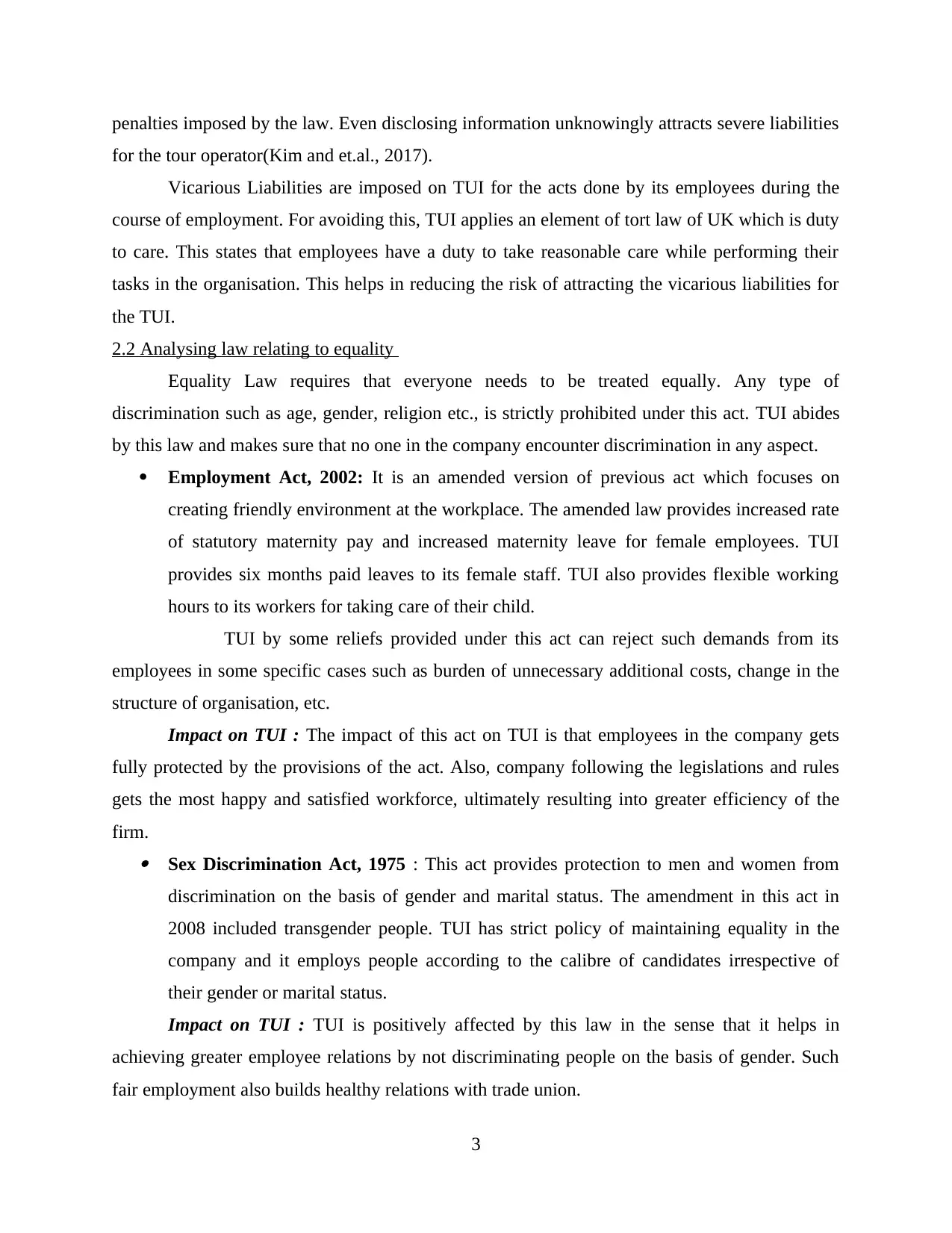
penalties imposed by the law. Even disclosing information unknowingly attracts severe liabilities
for the tour operator(Kim and et.al., 2017).
Vicarious Liabilities are imposed on TUI for the acts done by its employees during the
course of employment. For avoiding this, TUI applies an element of tort law of UK which is duty
to care. This states that employees have a duty to take reasonable care while performing their
tasks in the organisation. This helps in reducing the risk of attracting the vicarious liabilities for
the TUI.
2.2 Analysing law relating to equality
Equality Law requires that everyone needs to be treated equally. Any type of
discrimination such as age, gender, religion etc., is strictly prohibited under this act. TUI abides
by this law and makes sure that no one in the company encounter discrimination in any aspect.
Employment Act, 2002: It is an amended version of previous act which focuses on
creating friendly environment at the workplace. The amended law provides increased rate
of statutory maternity pay and increased maternity leave for female employees. TUI
provides six months paid leaves to its female staff. TUI also provides flexible working
hours to its workers for taking care of their child.
TUI by some reliefs provided under this act can reject such demands from its
employees in some specific cases such as burden of unnecessary additional costs, change in the
structure of organisation, etc.
Impact on TUI : The impact of this act on TUI is that employees in the company gets
fully protected by the provisions of the act. Also, company following the legislations and rules
gets the most happy and satisfied workforce, ultimately resulting into greater efficiency of the
firm. Sex Discrimination Act, 1975 : This act provides protection to men and women from
discrimination on the basis of gender and marital status. The amendment in this act in
2008 included transgender people. TUI has strict policy of maintaining equality in the
company and it employs people according to the calibre of candidates irrespective of
their gender or marital status.
Impact on TUI : TUI is positively affected by this law in the sense that it helps in
achieving greater employee relations by not discriminating people on the basis of gender. Such
fair employment also builds healthy relations with trade union.
3
for the tour operator(Kim and et.al., 2017).
Vicarious Liabilities are imposed on TUI for the acts done by its employees during the
course of employment. For avoiding this, TUI applies an element of tort law of UK which is duty
to care. This states that employees have a duty to take reasonable care while performing their
tasks in the organisation. This helps in reducing the risk of attracting the vicarious liabilities for
the TUI.
2.2 Analysing law relating to equality
Equality Law requires that everyone needs to be treated equally. Any type of
discrimination such as age, gender, religion etc., is strictly prohibited under this act. TUI abides
by this law and makes sure that no one in the company encounter discrimination in any aspect.
Employment Act, 2002: It is an amended version of previous act which focuses on
creating friendly environment at the workplace. The amended law provides increased rate
of statutory maternity pay and increased maternity leave for female employees. TUI
provides six months paid leaves to its female staff. TUI also provides flexible working
hours to its workers for taking care of their child.
TUI by some reliefs provided under this act can reject such demands from its
employees in some specific cases such as burden of unnecessary additional costs, change in the
structure of organisation, etc.
Impact on TUI : The impact of this act on TUI is that employees in the company gets
fully protected by the provisions of the act. Also, company following the legislations and rules
gets the most happy and satisfied workforce, ultimately resulting into greater efficiency of the
firm. Sex Discrimination Act, 1975 : This act provides protection to men and women from
discrimination on the basis of gender and marital status. The amendment in this act in
2008 included transgender people. TUI has strict policy of maintaining equality in the
company and it employs people according to the calibre of candidates irrespective of
their gender or marital status.
Impact on TUI : TUI is positively affected by this law in the sense that it helps in
achieving greater employee relations by not discriminating people on the basis of gender. Such
fair employment also builds healthy relations with trade union.
3
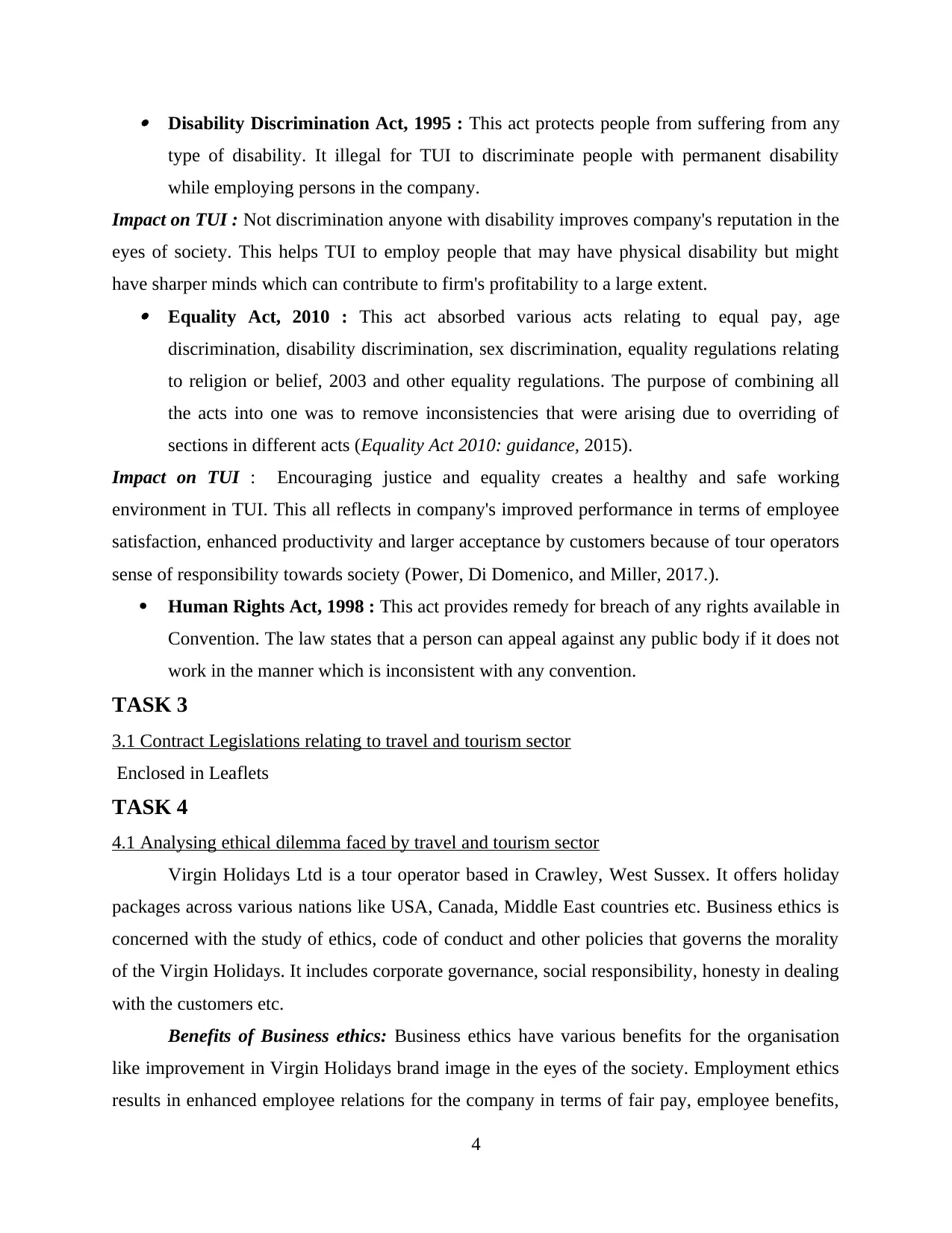
Disability Discrimination Act, 1995 : This act protects people from suffering from any
type of disability. It illegal for TUI to discriminate people with permanent disability
while employing persons in the company.
Impact on TUI : Not discrimination anyone with disability improves company's reputation in the
eyes of society. This helps TUI to employ people that may have physical disability but might
have sharper minds which can contribute to firm's profitability to a large extent. Equality Act, 2010 : This act absorbed various acts relating to equal pay, age
discrimination, disability discrimination, sex discrimination, equality regulations relating
to religion or belief, 2003 and other equality regulations. The purpose of combining all
the acts into one was to remove inconsistencies that were arising due to overriding of
sections in different acts (Equality Act 2010: guidance, 2015).
Impact on TUI : Encouraging justice and equality creates a healthy and safe working
environment in TUI. This all reflects in company's improved performance in terms of employee
satisfaction, enhanced productivity and larger acceptance by customers because of tour operators
sense of responsibility towards society (Power, Di Domenico, and Miller, 2017.).
Human Rights Act, 1998 : This act provides remedy for breach of any rights available in
Convention. The law states that a person can appeal against any public body if it does not
work in the manner which is inconsistent with any convention.
TASK 3
3.1 Contract Legislations relating to travel and tourism sector
Enclosed in Leaflets
TASK 4
4.1 Analysing ethical dilemma faced by travel and tourism sector
Virgin Holidays Ltd is a tour operator based in Crawley, West Sussex. It offers holiday
packages across various nations like USA, Canada, Middle East countries etc. Business ethics is
concerned with the study of ethics, code of conduct and other policies that governs the morality
of the Virgin Holidays. It includes corporate governance, social responsibility, honesty in dealing
with the customers etc.
Benefits of Business ethics: Business ethics have various benefits for the organisation
like improvement in Virgin Holidays brand image in the eyes of the society. Employment ethics
results in enhanced employee relations for the company in terms of fair pay, employee benefits,
4
type of disability. It illegal for TUI to discriminate people with permanent disability
while employing persons in the company.
Impact on TUI : Not discrimination anyone with disability improves company's reputation in the
eyes of society. This helps TUI to employ people that may have physical disability but might
have sharper minds which can contribute to firm's profitability to a large extent. Equality Act, 2010 : This act absorbed various acts relating to equal pay, age
discrimination, disability discrimination, sex discrimination, equality regulations relating
to religion or belief, 2003 and other equality regulations. The purpose of combining all
the acts into one was to remove inconsistencies that were arising due to overriding of
sections in different acts (Equality Act 2010: guidance, 2015).
Impact on TUI : Encouraging justice and equality creates a healthy and safe working
environment in TUI. This all reflects in company's improved performance in terms of employee
satisfaction, enhanced productivity and larger acceptance by customers because of tour operators
sense of responsibility towards society (Power, Di Domenico, and Miller, 2017.).
Human Rights Act, 1998 : This act provides remedy for breach of any rights available in
Convention. The law states that a person can appeal against any public body if it does not
work in the manner which is inconsistent with any convention.
TASK 3
3.1 Contract Legislations relating to travel and tourism sector
Enclosed in Leaflets
TASK 4
4.1 Analysing ethical dilemma faced by travel and tourism sector
Virgin Holidays Ltd is a tour operator based in Crawley, West Sussex. It offers holiday
packages across various nations like USA, Canada, Middle East countries etc. Business ethics is
concerned with the study of ethics, code of conduct and other policies that governs the morality
of the Virgin Holidays. It includes corporate governance, social responsibility, honesty in dealing
with the customers etc.
Benefits of Business ethics: Business ethics have various benefits for the organisation
like improvement in Virgin Holidays brand image in the eyes of the society. Employment ethics
results in enhanced employee relations for the company in terms of fair pay, employee benefits,
4
⊘ This is a preview!⊘
Do you want full access?
Subscribe today to unlock all pages.

Trusted by 1+ million students worldwide
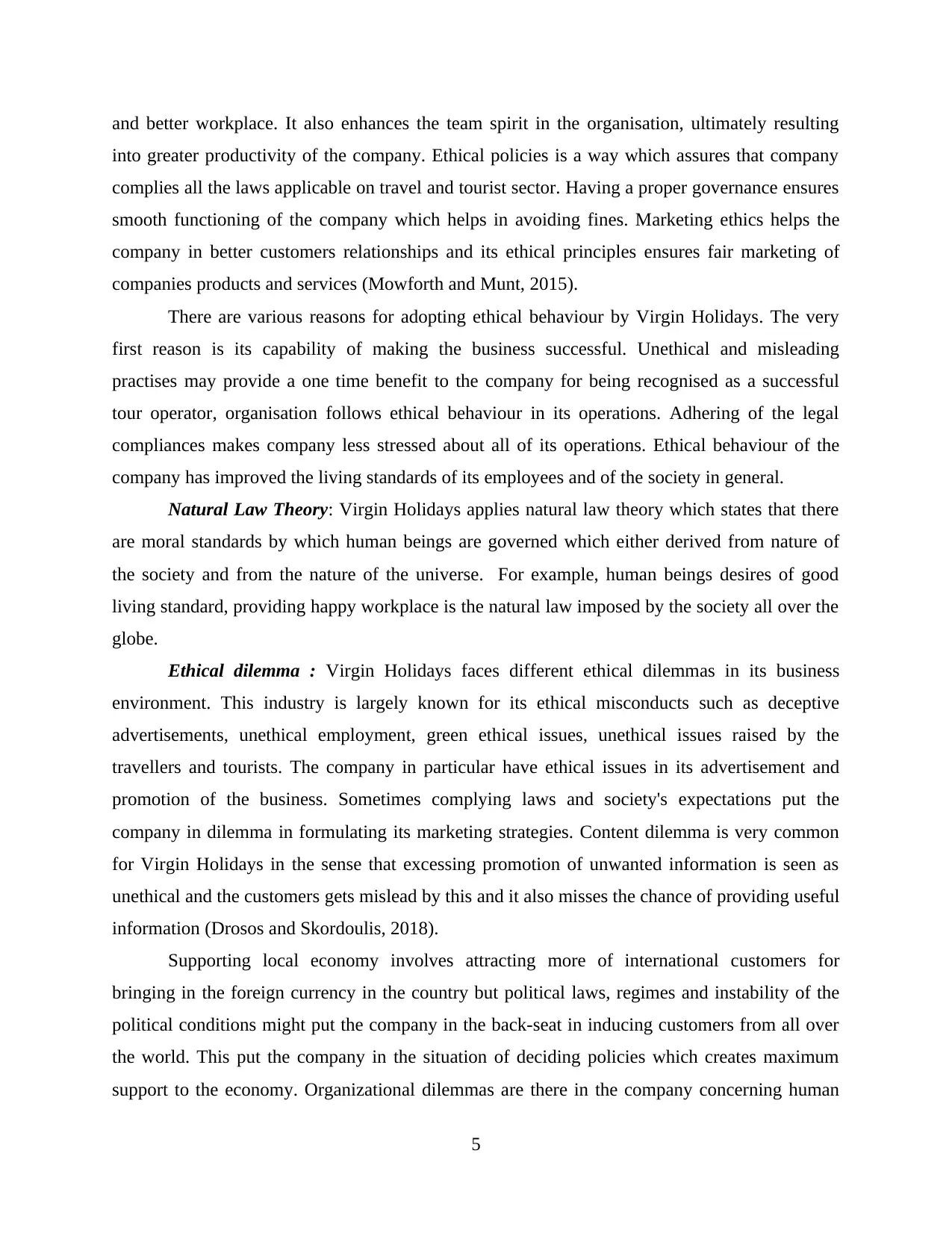
and better workplace. It also enhances the team spirit in the organisation, ultimately resulting
into greater productivity of the company. Ethical policies is a way which assures that company
complies all the laws applicable on travel and tourist sector. Having a proper governance ensures
smooth functioning of the company which helps in avoiding fines. Marketing ethics helps the
company in better customers relationships and its ethical principles ensures fair marketing of
companies products and services (Mowforth and Munt, 2015).
There are various reasons for adopting ethical behaviour by Virgin Holidays. The very
first reason is its capability of making the business successful. Unethical and misleading
practises may provide a one time benefit to the company for being recognised as a successful
tour operator, organisation follows ethical behaviour in its operations. Adhering of the legal
compliances makes company less stressed about all of its operations. Ethical behaviour of the
company has improved the living standards of its employees and of the society in general.
Natural Law Theory: Virgin Holidays applies natural law theory which states that there
are moral standards by which human beings are governed which either derived from nature of
the society and from the nature of the universe. For example, human beings desires of good
living standard, providing happy workplace is the natural law imposed by the society all over the
globe.
Ethical dilemma : Virgin Holidays faces different ethical dilemmas in its business
environment. This industry is largely known for its ethical misconducts such as deceptive
advertisements, unethical employment, green ethical issues, unethical issues raised by the
travellers and tourists. The company in particular have ethical issues in its advertisement and
promotion of the business. Sometimes complying laws and society's expectations put the
company in dilemma in formulating its marketing strategies. Content dilemma is very common
for Virgin Holidays in the sense that excessing promotion of unwanted information is seen as
unethical and the customers gets mislead by this and it also misses the chance of providing useful
information (Drosos and Skordoulis, 2018).
Supporting local economy involves attracting more of international customers for
bringing in the foreign currency in the country but political laws, regimes and instability of the
political conditions might put the company in the back-seat in inducing customers from all over
the world. This put the company in the situation of deciding policies which creates maximum
support to the economy. Organizational dilemmas are there in the company concerning human
5
into greater productivity of the company. Ethical policies is a way which assures that company
complies all the laws applicable on travel and tourist sector. Having a proper governance ensures
smooth functioning of the company which helps in avoiding fines. Marketing ethics helps the
company in better customers relationships and its ethical principles ensures fair marketing of
companies products and services (Mowforth and Munt, 2015).
There are various reasons for adopting ethical behaviour by Virgin Holidays. The very
first reason is its capability of making the business successful. Unethical and misleading
practises may provide a one time benefit to the company for being recognised as a successful
tour operator, organisation follows ethical behaviour in its operations. Adhering of the legal
compliances makes company less stressed about all of its operations. Ethical behaviour of the
company has improved the living standards of its employees and of the society in general.
Natural Law Theory: Virgin Holidays applies natural law theory which states that there
are moral standards by which human beings are governed which either derived from nature of
the society and from the nature of the universe. For example, human beings desires of good
living standard, providing happy workplace is the natural law imposed by the society all over the
globe.
Ethical dilemma : Virgin Holidays faces different ethical dilemmas in its business
environment. This industry is largely known for its ethical misconducts such as deceptive
advertisements, unethical employment, green ethical issues, unethical issues raised by the
travellers and tourists. The company in particular have ethical issues in its advertisement and
promotion of the business. Sometimes complying laws and society's expectations put the
company in dilemma in formulating its marketing strategies. Content dilemma is very common
for Virgin Holidays in the sense that excessing promotion of unwanted information is seen as
unethical and the customers gets mislead by this and it also misses the chance of providing useful
information (Drosos and Skordoulis, 2018).
Supporting local economy involves attracting more of international customers for
bringing in the foreign currency in the country but political laws, regimes and instability of the
political conditions might put the company in the back-seat in inducing customers from all over
the world. This put the company in the situation of deciding policies which creates maximum
support to the economy. Organizational dilemmas are there in the company concerning human
5
Paraphrase This Document
Need a fresh take? Get an instant paraphrase of this document with our AI Paraphraser
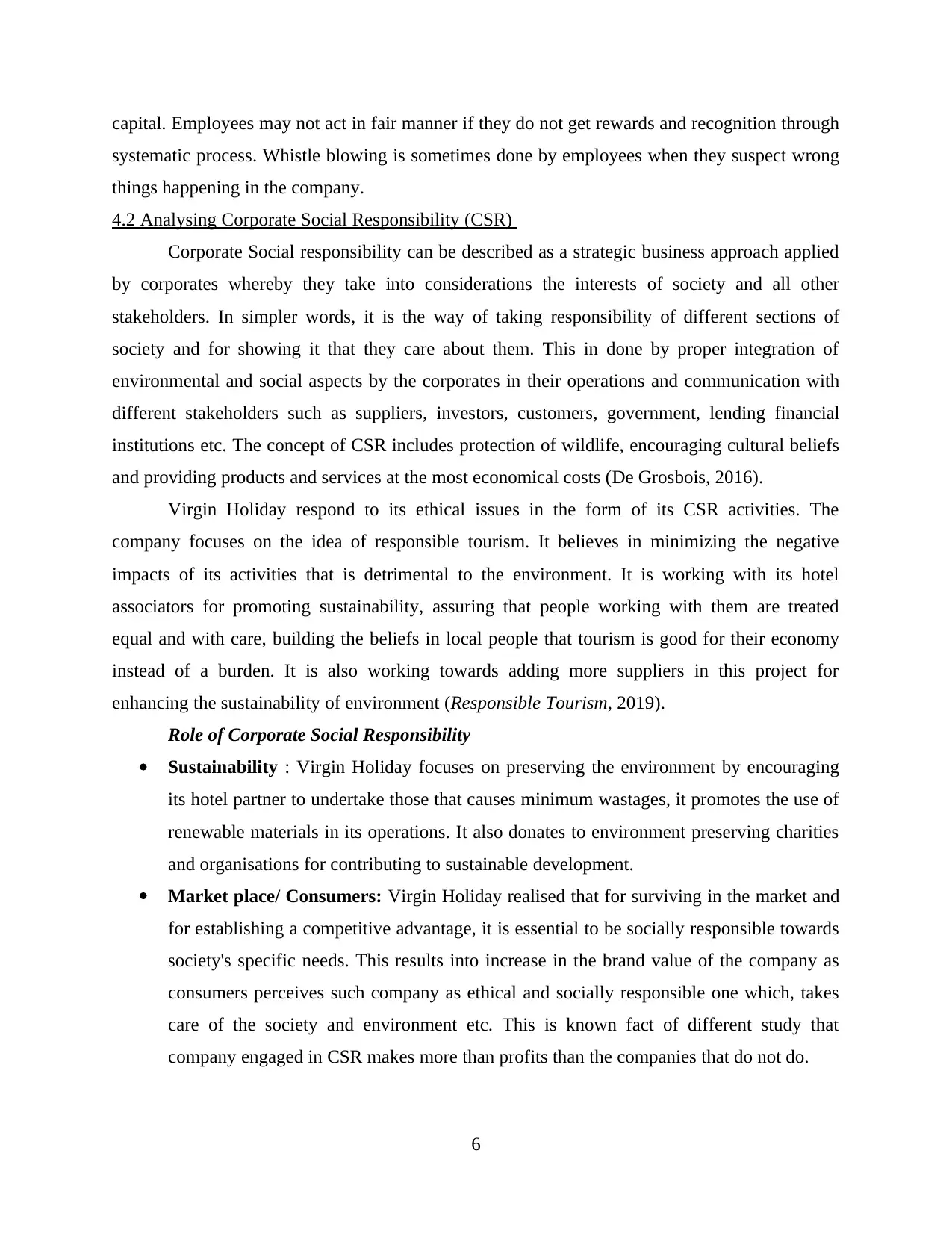
capital. Employees may not act in fair manner if they do not get rewards and recognition through
systematic process. Whistle blowing is sometimes done by employees when they suspect wrong
things happening in the company.
4.2 Analysing Corporate Social Responsibility (CSR)
Corporate Social responsibility can be described as a strategic business approach applied
by corporates whereby they take into considerations the interests of society and all other
stakeholders. In simpler words, it is the way of taking responsibility of different sections of
society and for showing it that they care about them. This in done by proper integration of
environmental and social aspects by the corporates in their operations and communication with
different stakeholders such as suppliers, investors, customers, government, lending financial
institutions etc. The concept of CSR includes protection of wildlife, encouraging cultural beliefs
and providing products and services at the most economical costs (De Grosbois, 2016).
Virgin Holiday respond to its ethical issues in the form of its CSR activities. The
company focuses on the idea of responsible tourism. It believes in minimizing the negative
impacts of its activities that is detrimental to the environment. It is working with its hotel
associators for promoting sustainability, assuring that people working with them are treated
equal and with care, building the beliefs in local people that tourism is good for their economy
instead of a burden. It is also working towards adding more suppliers in this project for
enhancing the sustainability of environment (Responsible Tourism, 2019).
Role of Corporate Social Responsibility
Sustainability : Virgin Holiday focuses on preserving the environment by encouraging
its hotel partner to undertake those that causes minimum wastages, it promotes the use of
renewable materials in its operations. It also donates to environment preserving charities
and organisations for contributing to sustainable development.
Market place/ Consumers: Virgin Holiday realised that for surviving in the market and
for establishing a competitive advantage, it is essential to be socially responsible towards
society's specific needs. This results into increase in the brand value of the company as
consumers perceives such company as ethical and socially responsible one which, takes
care of the society and environment etc. This is known fact of different study that
company engaged in CSR makes more than profits than the companies that do not do.
6
systematic process. Whistle blowing is sometimes done by employees when they suspect wrong
things happening in the company.
4.2 Analysing Corporate Social Responsibility (CSR)
Corporate Social responsibility can be described as a strategic business approach applied
by corporates whereby they take into considerations the interests of society and all other
stakeholders. In simpler words, it is the way of taking responsibility of different sections of
society and for showing it that they care about them. This in done by proper integration of
environmental and social aspects by the corporates in their operations and communication with
different stakeholders such as suppliers, investors, customers, government, lending financial
institutions etc. The concept of CSR includes protection of wildlife, encouraging cultural beliefs
and providing products and services at the most economical costs (De Grosbois, 2016).
Virgin Holiday respond to its ethical issues in the form of its CSR activities. The
company focuses on the idea of responsible tourism. It believes in minimizing the negative
impacts of its activities that is detrimental to the environment. It is working with its hotel
associators for promoting sustainability, assuring that people working with them are treated
equal and with care, building the beliefs in local people that tourism is good for their economy
instead of a burden. It is also working towards adding more suppliers in this project for
enhancing the sustainability of environment (Responsible Tourism, 2019).
Role of Corporate Social Responsibility
Sustainability : Virgin Holiday focuses on preserving the environment by encouraging
its hotel partner to undertake those that causes minimum wastages, it promotes the use of
renewable materials in its operations. It also donates to environment preserving charities
and organisations for contributing to sustainable development.
Market place/ Consumers: Virgin Holiday realised that for surviving in the market and
for establishing a competitive advantage, it is essential to be socially responsible towards
society's specific needs. This results into increase in the brand value of the company as
consumers perceives such company as ethical and socially responsible one which, takes
care of the society and environment etc. This is known fact of different study that
company engaged in CSR makes more than profits than the companies that do not do.
6
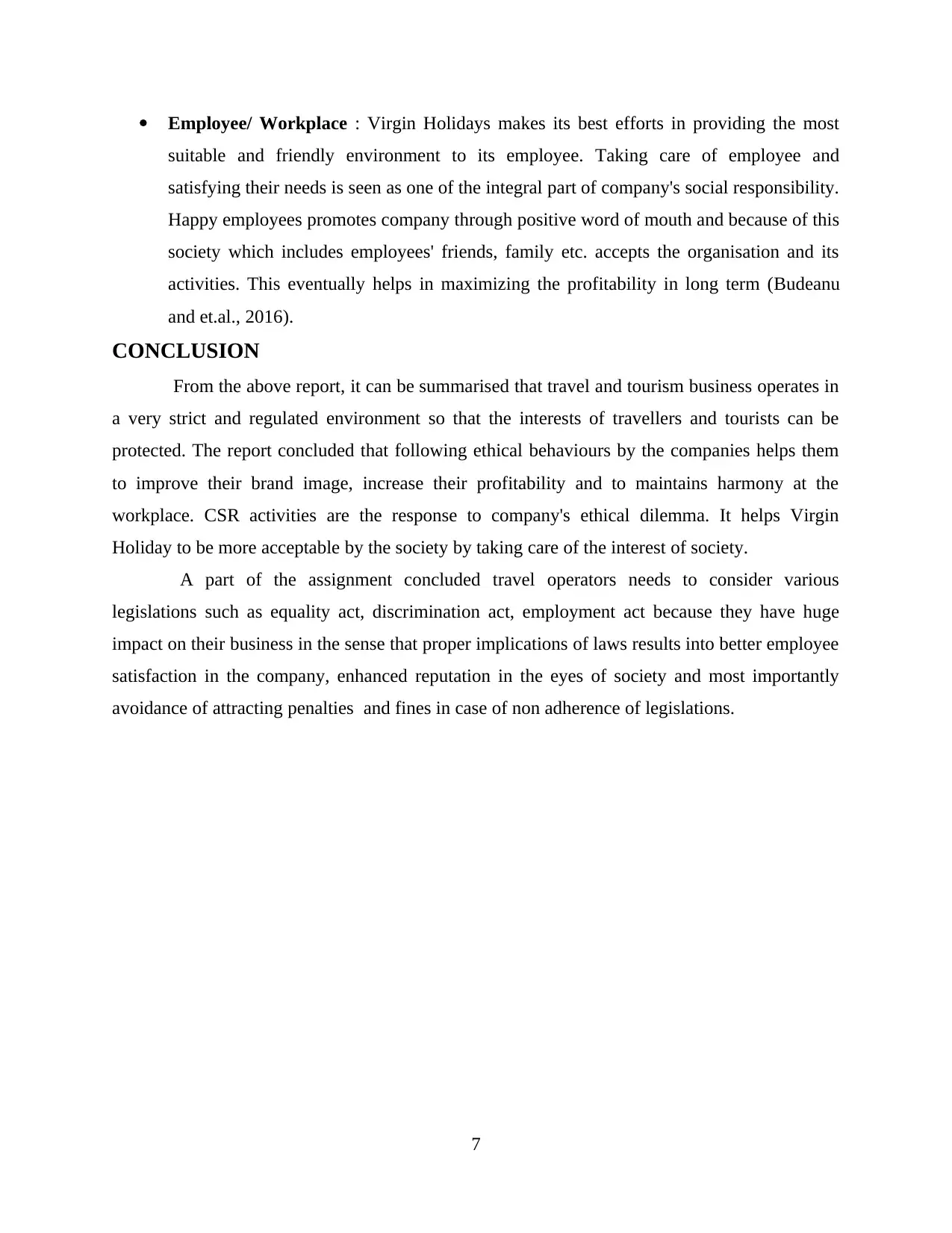
Employee/ Workplace : Virgin Holidays makes its best efforts in providing the most
suitable and friendly environment to its employee. Taking care of employee and
satisfying their needs is seen as one of the integral part of company's social responsibility.
Happy employees promotes company through positive word of mouth and because of this
society which includes employees' friends, family etc. accepts the organisation and its
activities. This eventually helps in maximizing the profitability in long term (Budeanu
and et.al., 2016).
CONCLUSION
From the above report, it can be summarised that travel and tourism business operates in
a very strict and regulated environment so that the interests of travellers and tourists can be
protected. The report concluded that following ethical behaviours by the companies helps them
to improve their brand image, increase their profitability and to maintains harmony at the
workplace. CSR activities are the response to company's ethical dilemma. It helps Virgin
Holiday to be more acceptable by the society by taking care of the interest of society.
A part of the assignment concluded travel operators needs to consider various
legislations such as equality act, discrimination act, employment act because they have huge
impact on their business in the sense that proper implications of laws results into better employee
satisfaction in the company, enhanced reputation in the eyes of society and most importantly
avoidance of attracting penalties and fines in case of non adherence of legislations.
7
suitable and friendly environment to its employee. Taking care of employee and
satisfying their needs is seen as one of the integral part of company's social responsibility.
Happy employees promotes company through positive word of mouth and because of this
society which includes employees' friends, family etc. accepts the organisation and its
activities. This eventually helps in maximizing the profitability in long term (Budeanu
and et.al., 2016).
CONCLUSION
From the above report, it can be summarised that travel and tourism business operates in
a very strict and regulated environment so that the interests of travellers and tourists can be
protected. The report concluded that following ethical behaviours by the companies helps them
to improve their brand image, increase their profitability and to maintains harmony at the
workplace. CSR activities are the response to company's ethical dilemma. It helps Virgin
Holiday to be more acceptable by the society by taking care of the interest of society.
A part of the assignment concluded travel operators needs to consider various
legislations such as equality act, discrimination act, employment act because they have huge
impact on their business in the sense that proper implications of laws results into better employee
satisfaction in the company, enhanced reputation in the eyes of society and most importantly
avoidance of attracting penalties and fines in case of non adherence of legislations.
7
⊘ This is a preview!⊘
Do you want full access?
Subscribe today to unlock all pages.

Trusted by 1+ million students worldwide
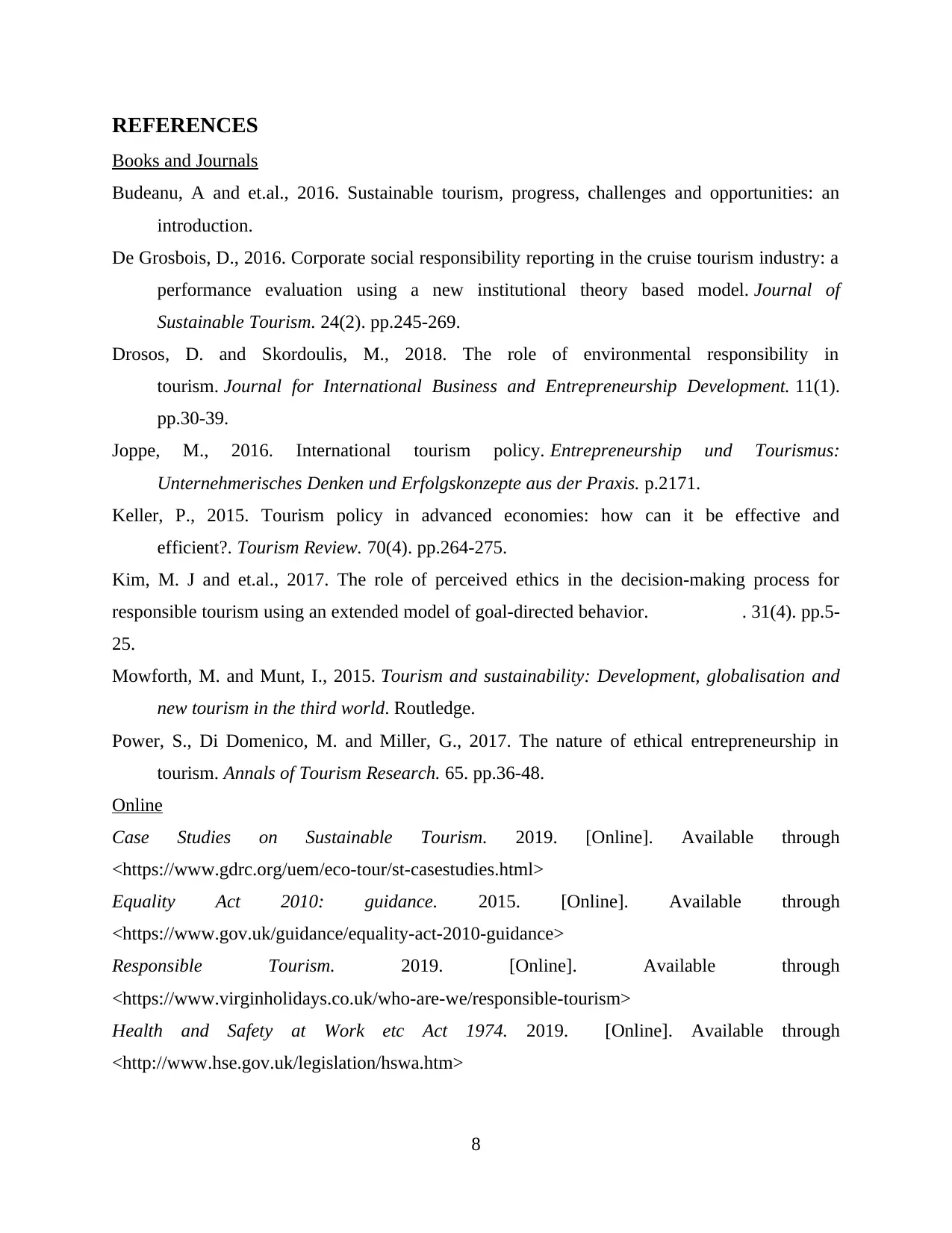
REFERENCES
Books and Journals
Budeanu, A and et.al., 2016. Sustainable tourism, progress, challenges and opportunities: an
introduction.
De Grosbois, D., 2016. Corporate social responsibility reporting in the cruise tourism industry: a
performance evaluation using a new institutional theory based model. Journal of
Sustainable Tourism. 24(2). pp.245-269.
Drosos, D. and Skordoulis, M., 2018. The role of environmental responsibility in
tourism. Journal for International Business and Entrepreneurship Development. 11(1).
pp.30-39.
Joppe, M., 2016. International tourism policy. Entrepreneurship und Tourismus:
Unternehmerisches Denken und Erfolgskonzepte aus der Praxis. p.2171.
Keller, P., 2015. Tourism policy in advanced economies: how can it be effective and
efficient?. Tourism Review. 70(4). pp.264-275.
Kim, M. J and et.al., 2017. The role of perceived ethics in the decision-making process for
responsible tourism using an extended model of goal-directed behavior. 관관관관관관. 31(4). pp.5-
25.
Mowforth, M. and Munt, I., 2015. Tourism and sustainability: Development, globalisation and
new tourism in the third world. Routledge.
Power, S., Di Domenico, M. and Miller, G., 2017. The nature of ethical entrepreneurship in
tourism. Annals of Tourism Research. 65. pp.36-48.
Online
Case Studies on Sustainable Tourism. 2019. [Online]. Available through
<https://www.gdrc.org/uem/eco-tour/st-casestudies.html>
Equality Act 2010: guidance. 2015. [Online]. Available through
<https://www.gov.uk/guidance/equality-act-2010-guidance>
Responsible Tourism. 2019. [Online]. Available through
<https://www.virginholidays.co.uk/who-are-we/responsible-tourism>
Health and Safety at Work etc Act 1974. 2019. [Online]. Available through
<http://www.hse.gov.uk/legislation/hswa.htm>
8
Books and Journals
Budeanu, A and et.al., 2016. Sustainable tourism, progress, challenges and opportunities: an
introduction.
De Grosbois, D., 2016. Corporate social responsibility reporting in the cruise tourism industry: a
performance evaluation using a new institutional theory based model. Journal of
Sustainable Tourism. 24(2). pp.245-269.
Drosos, D. and Skordoulis, M., 2018. The role of environmental responsibility in
tourism. Journal for International Business and Entrepreneurship Development. 11(1).
pp.30-39.
Joppe, M., 2016. International tourism policy. Entrepreneurship und Tourismus:
Unternehmerisches Denken und Erfolgskonzepte aus der Praxis. p.2171.
Keller, P., 2015. Tourism policy in advanced economies: how can it be effective and
efficient?. Tourism Review. 70(4). pp.264-275.
Kim, M. J and et.al., 2017. The role of perceived ethics in the decision-making process for
responsible tourism using an extended model of goal-directed behavior. 관관관관관관. 31(4). pp.5-
25.
Mowforth, M. and Munt, I., 2015. Tourism and sustainability: Development, globalisation and
new tourism in the third world. Routledge.
Power, S., Di Domenico, M. and Miller, G., 2017. The nature of ethical entrepreneurship in
tourism. Annals of Tourism Research. 65. pp.36-48.
Online
Case Studies on Sustainable Tourism. 2019. [Online]. Available through
<https://www.gdrc.org/uem/eco-tour/st-casestudies.html>
Equality Act 2010: guidance. 2015. [Online]. Available through
<https://www.gov.uk/guidance/equality-act-2010-guidance>
Responsible Tourism. 2019. [Online]. Available through
<https://www.virginholidays.co.uk/who-are-we/responsible-tourism>
Health and Safety at Work etc Act 1974. 2019. [Online]. Available through
<http://www.hse.gov.uk/legislation/hswa.htm>
8
Paraphrase This Document
Need a fresh take? Get an instant paraphrase of this document with our AI Paraphraser

9
1 out of 11
Related Documents
Your All-in-One AI-Powered Toolkit for Academic Success.
+13062052269
info@desklib.com
Available 24*7 on WhatsApp / Email
![[object Object]](/_next/static/media/star-bottom.7253800d.svg)
Unlock your academic potential
Copyright © 2020–2026 A2Z Services. All Rights Reserved. Developed and managed by ZUCOL.




